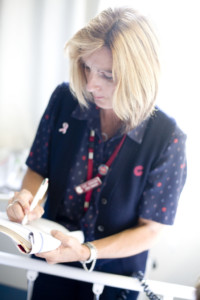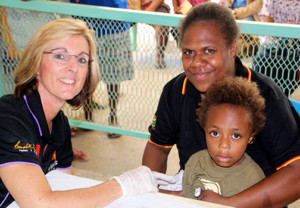 Sue Grasby RN, a nurse manager at Cabrini Malvern, has been awarded Catholic Health Australia’s (CHA) annual Nurse of the Year Award for 2017.
Sue Grasby RN, a nurse manager at Cabrini Malvern, has been awarded Catholic Health Australia’s (CHA) annual Nurse of the Year Award for 2017.
According to Professor Lee Boyd, Cabrini’s Executive Director of Nursing and the Cabrini Institute, Ms Grasby is a strong patient advocate. “I am thrilled that a Cabrini nurse has been awarded CHA Nurse of the Year,” said Professor Boyd. “She represents all nurses at Cabrini who work so hard every day to provide exceptional care.”
The award recognises Ms Grabsy’s volunteer contributions to healthcare services in Papua New Guinea (PNG). “She and her husband lead No Roads Health expeditions, which focus on providing healthcare for villages in PNG with no road access,” said Professor Boyd. “This commitment is undertaken during her annual leave and at considerable personal expense.”
The award includes a cash prize of $5000 for use in supporting a program or for professional development and a trophy.
Ms Grasby says she is committed to improving the health of the PNG people and engaging in health promotion to prevent illness in remote areas.
The road to PNG
 Ms Grasby’s involvement with providing health outreach services in PNG was sparked when she trekked the Kokoda Track with family and friends in 2010. Over eight days, the group passed through many small villages and interacted with local people. The experience provided an understanding of the isolation along the track and lack of access to basic health care and medical treatment.
Ms Grasby’s involvement with providing health outreach services in PNG was sparked when she trekked the Kokoda Track with family and friends in 2010. Over eight days, the group passed through many small villages and interacted with local people. The experience provided an understanding of the isolation along the track and lack of access to basic health care and medical treatment.
“I felt the need to respond to the chronic lack of health care that is being suffered by our close neighbours and which we take for granted in our country,” she said. “This experience affirmed my desire to give back and try to make a difference to these people who live in remote villages and lack so much in both access and availability of healthcare.”
In 2014, Ms Grasby began volunteering with No Roads Health. Together with a team of nurses, she returned to PNG to provide healthcare to those most in need. The team travelled by foot, car and boat to six remote coastal villages where many of the people they met had never seen a healthcare worker before let alone a nurse from Australia.
Since then, she has returned to PNG twice a year with No Roads Health, and now works as the clinical leader of the teams who volunteer their time and self-fund their trips. Small teams of health professionals, mainly nurses, support health needs within these remote communities, helping people maintain good health, and relieving health problems where possible. “During my most recent trip in March 2017, more than 640 patients attended our six clinics,” she said.
A trusted presence
During her health outreach trips to PNG, Ms Grasby seeks to support and mentor local PNG health care workers and village health assistants who visit remote villages with the team.
“Our clinics see many children with ear conditions related to life near the ocean, tropical leg ulcers compounded by heat and humidity, and many illnesses and disease processes that can be fatal in these remote areas but would be resolved with a simple visit to a GP in Australia,” said Ms Grasby.
Some villagers will often walk or canoe long distances, up to eight hours, to visit the clinics and the team visits elderly or dying people in their homes if they cannot attend.
Ms Grasby’s work includes extensive assessments for PNG children who have congenital or acquired disabilities, injuries and illnesses, for consideration of corrective surgery in conjunction with Children First Foundation (CFF).
“I am dedicated to improving the health and welfare of these people, all the while learning more about the new ailments that are prolific in these regions, many of which are unseen in Australia,” she said. “This cause has become a personal passion of mine and one which I am sharing with others at Cabrini with the primary focus of being to improve healthcare outcomes for those in the remotest areas of PNG.”
